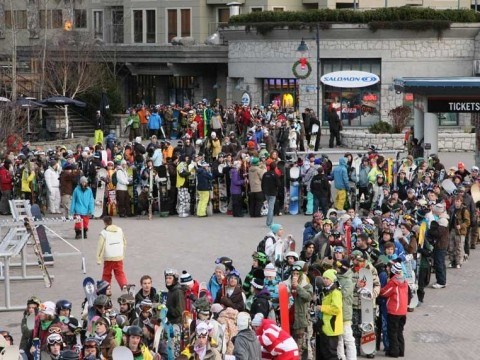The much-challenged ski industry is growing more doubtful by the day that the province will exempt it from the planned harmonized sales tax (HST).
That means, effective July 1, 2010, the price of a ski holiday could, in effect, jump up by seven per cent.
"All the things they're not saying rather points to the direction that they will not drop the tax," said Jimmie Spencer, president of the Canada West Ski Areas Association (CWSAA), to whom Whistler Blackcomb deferred for comment on the issue.
"We've asked him (the finance minister and the tourism minister) if it's possible to exempt all the tourism operators from this tax because it really is quite a regressive tax to tourism operators. Whether he will do that or not, I don't know. He hasn't said."
Things previously exempt from the seven per cent provincial sales tax (PST), such as ski lift tickets and restaurant food, will then be subject to the 12 per cent HST.
This week, however, B.C.'s Minister of Tourism, Culture and the Arts Kevin Krueger acknowledged the concerns of the tourism industry, but said they may prove to be unfounded in the long run.
"I don't think that people will decide not to come to British Columbia because of HST," said Krueger. "I think that when people are planning a trip, they probably have an eye on what the tax structure is. I think British Columbia will remain very competitive with the rest of the world and I believe that when all the dust has settled people will find that there has not been a dramatic effect and whatever effect there might have been will be lost in all the positive things that are already happening."
The positive things Krueger is referring to are all the spin-offs related to the 2010 Olympic and Paralympic Games.
But in this tough economic climate, Spencer isn't so quick to dismiss the challenges a seven per cent hike may pose to ski area operators.
"Almost everything they sell to the public as far as that holiday is concerned is probably not being charged with PST at the moment," said Spencer. "It's a seven per cent difference they've got to deal with."
Last season British Columbia saw an overall decline of one million skier visits as the world settled into a global recession.
"It's been a tough couple of years, the last season in particular because of the general economic downturn which is worldwide," said Spencer. "And so to have this on top of that is a further thing to grapple with."
If the province does not grant tourism operators an exemption, Spencer said the next step is to look at ways to ease the transition to the HST.
He suggested modifying the amount of tax that tourism operators pay, or perhaps phasing it over two or three years so as not to impact customers in one fell swoop.
Stephen Regan, president and CEO of the Council of Tourism Associations (COTA), is also lobbing on behalf of the industry for exemptions or phasing of the tax.
He said he doesn't know if the added tax will affect tourism in the province.
"The point is, nobody really knows how the consumer is going to respond," he said.
"We'd like to think through this with government."
He is also looking at the bigger picture. Changes to the tax structure affect the way tourism marketing associations are funded.
"This is very dynamic, complex modeling and nobody knows the specific answers."
Krueger acknowledged the HST will have a different effect on tourism and restaurant operators than many other small businesses. But he said B.C. did not want to be left behind in what he sees as a nation-wide move to adopt HST. Ontario, he said, was the tipping point. It will harmonize its taxes at the same time as B.C.
Krueger said the move is also in part a response to small businesses in B.C. who complained time and again when he was small business minister about the onerous and sometimes confusing PST system in the province.
"The effect on many businesses in Whistler will be a positive one because their administrative overburden is greatly reduced," said Krueger. "We're doing what most small businesses in B.C. wanted."
And if the impact of the Olympics pans out the way the province hopes, the tourism industry will be on the right track for years to come.
"I think that Whistler is going to find itself hair-straight-back busy and doing great, not just through the Olympics but for decades to follow because we're going to capitalize on this opportunity," said Krueger.
"So I think that the implementation of the HST, when people look at it years down the road, and not that many years down the road in the not so distant future, is going to be seen by most people as a streamlining move that was really good for all concerned."
COTA is planning to meet with Finance Minister Colin Hansen in early October to discuss the issue.
Regan said: "The burden is falling on us to make a case so compelling that it wins."




